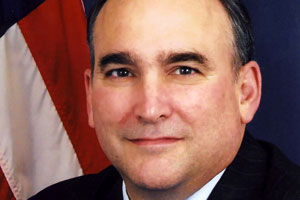Senior Reporter
FHWA’s Nadeau Says States Need Long-Term Highway Funding

WASHINGTON — Acting Federal Highway Administrator Gregory Nadeau on Sept. 30 urged lawmakers to approve a “long-term, sustainable” transportation funding measure in order to help advance the efforts by states and municipalities to repair or replace aging infrastructure.
Nadeau added that without a multiyear federal highway law, local officials lack much-needed guidance to prepare and execute efforts to modernize their transportation networks.
“Until we have a predictable, reliable, long-term ability to invest in transportation assets, it’s going to be very difficult to persuade state DOTs, local transportation agencies on the ground — who are reacting to public demand for services and for assets — it’s going to be very difficult to get them to think long-term if they are looking at short-term commitments and resources,” Nadeau said.
He was speaking on Capitol Hill at the unveiling of a study that assessed ways of maximizing transportation project investments.
The study, which argues for the implementation of life cycle cost analysis to account for the total costs of infrastructure projects, was published by the nonprofit Eno Center for Transportation and the American Society of Civil Engineers.
For the past several years, Congress has approved a series of short-term extensions for transportation funding. This summer, President Obama signed a bill that extended a 2012 transportation law's two-year authorization to May 2015.
The acting administrator also touted the Obama administration’s four-year, $302 billion transportation blueprint called the Grow America Act. That legislative proposal, which is not expected to advance through Congress this year, would overhaul corporate tax structures to generate about $150 billion in revenue for the federal Highway Trust Fund.
The trust fund is used to help states pay for infrastructure projects, but its reliance on a national tax on gas and diesel fuel fails to generate the necessary revenue to meet its financial obligations to states.

